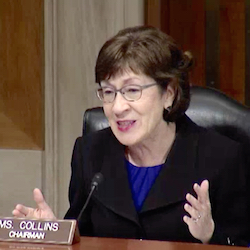
For the third consecutive year, in 2017, IRS impersonation scams were the top type of scams reported to the Senate Special Committee on Aging’s fraud hotline, according to the committee, which released its 2018 “Fraud Book” and held a hearing on the topic on Wednesday.
In 2017, IRS impersonation scams were the subject of 381 calls to the hotline, down from 1,680 calls in 2016 and 387 calls in 2015, according to the report, which has the formal title “Fighting Fraud: Senate Aging Committee Identifies Top 10 Scams Targeting Our Nation’s Seniors.”
“In this scam, a con artist pretending to represent the IRS calls demanding money for supposedly past due taxes,” Sen. Susan Collins (R-ME), chairman of the committee, said at the hearing. “The criminals often demand payment in the form of gift cards, and they threaten their victims with arrest if they don’t pay up immediately.”
The hotline received a total of 1,463 complaints in 2017. The committee accepts calls at (855) 303-9470 and online complaints at https://www.aging.senate.gov/fraud-hotline.
“The impact of scams on older adults can have dire consequences — and that’s probably an understatement,” said Sen. Bob Casey (D-PA), ranking member of the committee. “For many seniors, their ‘nest egg’ may represent a significant source of their monthly income, allowing them to afford rent, healthcare and food. Once their funds are stolen, they often never receive adequate retribution for their loss.”
Interestingly, according to the report, the two states where the most calls came from were Collins’ and Casey’s home states of Maine and Pennsylvania, with 521 and 162 calls, respectively. The state with the next highest number of calls was Florida, with 79 calls.
The top 10 most commonly reported scams account for more than 75% of the complaints received by the hotline in 2017, according to the report.
The rankings:
- IRS impersonation scams, the topic of 381 complaints
- Robocalls / Unsolicited phone calls, 166
- Sweepstakes / Jamaican lottery scam, 111
- “Can you hear me?” scam, 97
- Grandparent scam, 87
- Computer scam, 79
- Romance scam, 64
- Elder financial abuse, 51
- Identity theft, 40
- Government grant scam, 37
The Fraud Book describes each type of scam and also lists the most common types of scams for each state. Additionally, it lists anti-fraud resources.



